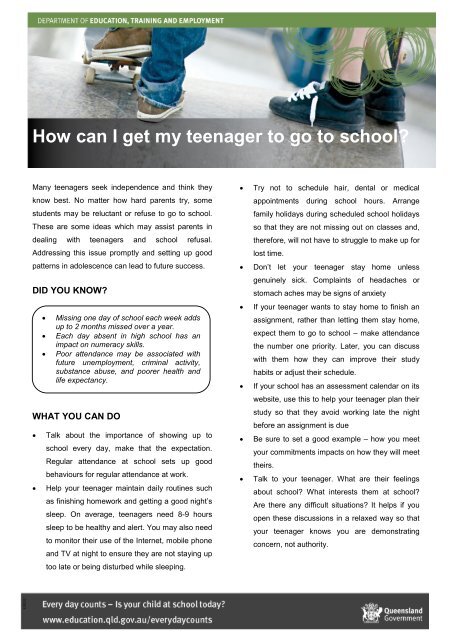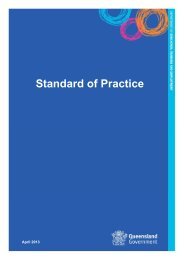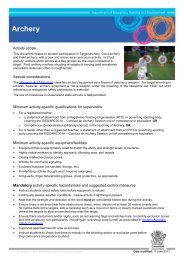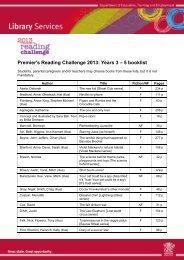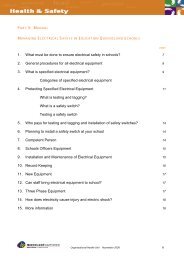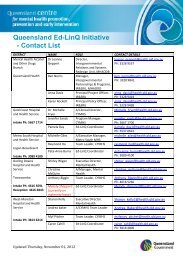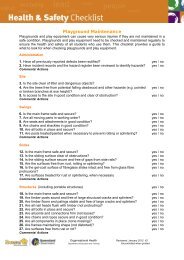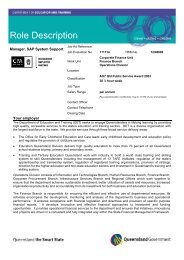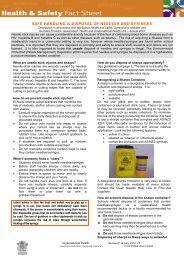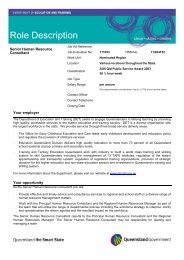Parent information sheet: How can I get my teenager to go to school
Parent information sheet: How can I get my teenager to go to school
Parent information sheet: How can I get my teenager to go to school
You also want an ePaper? Increase the reach of your titles
YUMPU automatically turns print PDFs into web optimized ePapers that Google loves.
<strong>How</strong> <strong>can</strong> I <strong>get</strong> <strong>my</strong> <strong>teenager</strong> <strong>to</strong> <strong>go</strong> <strong>to</strong> <strong>school</strong>?<br />
Many <strong>teenager</strong>s seek independence and think they<br />
know best. No matter how hard parents try, some<br />
students may be reluctant or refuse <strong>to</strong> <strong>go</strong> <strong>to</strong> <strong>school</strong>.<br />
These are some ideas which may assist parents in<br />
dealing with <strong>teenager</strong>s and <strong>school</strong> refusal.<br />
Addressing this issue promptly and setting up <strong>go</strong>od<br />
patterns in adolescence <strong>can</strong> lead <strong>to</strong> future success.<br />
DID YOU KNOW?<br />
• Missing one day of <strong>school</strong> each week adds<br />
up <strong>to</strong> 2 months missed over a year.<br />
• Each day absent in high <strong>school</strong> has an<br />
impact on numeracy skills.<br />
• Poor attendance may be associated with<br />
future unemployment, criminal activity,<br />
substance abuse, and poorer health and<br />
life expectancy.<br />
WHAT YOU CAN DO<br />
• Talk about the importance of showing up <strong>to</strong><br />
<strong>school</strong> every day, make that the expectation.<br />
Regular attendance at <strong>school</strong> sets up <strong>go</strong>od<br />
behaviours for regular attendance at work.<br />
• Help your <strong>teenager</strong> maintain daily routines such<br />
as finishing homework and <strong>get</strong>ting a <strong>go</strong>od night’s<br />
sleep. On average, <strong>teenager</strong>s need 8-9 hours<br />
sleep <strong>to</strong> be healthy and alert. You may also need<br />
<strong>to</strong> moni<strong>to</strong>r their use of the Internet, mobile phone<br />
and TV at night <strong>to</strong> ensure they are not staying up<br />
<strong>to</strong>o late or being disturbed while sleeping.<br />
• Try not <strong>to</strong> schedule hair, dental or medical<br />
appointments during <strong>school</strong> hours. Arrange<br />
family holidays during scheduled <strong>school</strong> holidays<br />
so that they are not missing out on classes and,<br />
therefore, will not have <strong>to</strong> struggle <strong>to</strong> make up for<br />
lost time.<br />
• Don’t let your <strong>teenager</strong> stay home unless<br />
genuinely sick. Complaints of headaches or<br />
s<strong>to</strong>mach aches may be signs of anxiety<br />
• If your <strong>teenager</strong> wants <strong>to</strong> stay home <strong>to</strong> finish an<br />
assignment, rather than letting them stay home,<br />
expect them <strong>to</strong> <strong>go</strong> <strong>to</strong> <strong>school</strong> – make attendance<br />
the number one priority. Later, you <strong>can</strong> discuss<br />
with them how they <strong>can</strong> improve their study<br />
habits or adjust their schedule.<br />
• If your <strong>school</strong> has an assessment calendar on its<br />
website, use this <strong>to</strong> help your <strong>teenager</strong> plan their<br />
study so that they avoid working late the night<br />
before an assignment is due<br />
• Be sure <strong>to</strong> set a <strong>go</strong>od example – how you meet<br />
your commitments impacts on how they will meet<br />
theirs.<br />
• Talk <strong>to</strong> your <strong>teenager</strong>. What are their feelings<br />
about <strong>school</strong>? What interests them at <strong>school</strong>?<br />
Are there any difficult situations? It helps if you<br />
open these discussions in a relaxed way so that<br />
your <strong>teenager</strong> knows you are demonstrating<br />
concern, not authority.
• Try <strong>to</strong> be aware of your <strong>teenager</strong>’s social<br />
contacts. Peer pressure <strong>can</strong> lead <strong>to</strong> skipping<br />
<strong>school</strong>, while students without many friends <strong>can</strong><br />
feel isolated.<br />
• Encourage meaningful extracurricular activities<br />
that your <strong>teenager</strong> enjoys, such as sports and<br />
clubs, <strong>to</strong> develop positive relationships and have<br />
success outside of a classroom setting. These<br />
activities <strong>can</strong> help your child feel part of the<br />
group, important <strong>to</strong> the <strong>school</strong>, and more<br />
motivated.<br />
• Set clear parameters around part-time work.<br />
Make sure that the hours your <strong>teenager</strong> is<br />
working do not impact on their ability <strong>to</strong> <strong>go</strong> <strong>to</strong><br />
<strong>school</strong> the next day, or interfere with <strong>school</strong><br />
assessment expectations or exam preparation.<br />
• Familiarise yourself with the <strong>school</strong>’s attendance<br />
policy. This <strong>can</strong> help when trying <strong>to</strong> reason with<br />
<strong>teenager</strong>s.<br />
• Moni<strong>to</strong>r your <strong>teenager</strong>’s attendance and <strong>school</strong><br />
performance. Periodically check with their<br />
teachers <strong>to</strong> find out how things are <strong>go</strong>ing. If you<br />
find it difficult <strong>to</strong> contact several different<br />
teachers by phone, try email. Alternatively, if your<br />
<strong>school</strong> has a year level coordina<strong>to</strong>r, they may be<br />
a helpful point of contact in relation <strong>to</strong> specific<br />
issues.<br />
USEFUL WEBSITES<br />
http://raisingchildren.net.au/<br />
http://www.mindmatters.edu.au/default.asp<br />
http://deta.qld.<strong>go</strong>v.au/initiatives/learningandwellbeing/<br />
resources.html#<br />
http://www.qld.<strong>go</strong>v.au/youth/health-looking-afteryourself/<br />
http://au.reachout.com/<br />
http://www.andrewfuller.com.au/article.php?Do=Cont<br />
entView&pageno=159&preprocscreen=ContentShow<br />
&menuvar=Green&menuval<br />
Remember…<br />
You <strong>can</strong> talk with <strong>school</strong> staff (such as the teacher,<br />
year level coordina<strong>to</strong>r, deputy principal or principal)<br />
<strong>to</strong> find out what assistance they <strong>can</strong> provide <strong>to</strong> keep<br />
your <strong>teenager</strong> attending and engaged.


